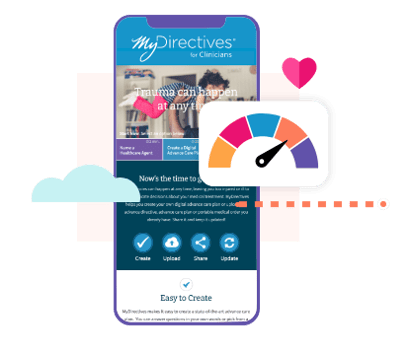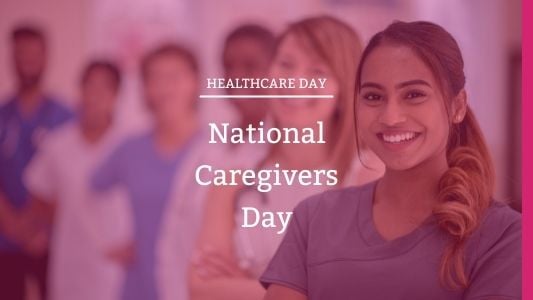4 min read
5 Reasons Why Hospitals Should Invest in Digital Advance Care Planning


A 2020 survey by the Society of Critical Care Medicine polled ICU nurses, physicians, nurse practitioners and other healthcare providers and found that stress and burnout have become a huge issue. With 10 being the most extreme level of personal stress, ICU clinicians self-reported their pandemic-era stress at level 8.
There are many contributing causes to this high level of stress. Frontline providers and hospital administrative staff are notoriously overworked under normal circumstances, a situation that has only worsened in the age of COVID-19. While medical personnel and administrative employees may understand the need for advance care planning (ACP), with their busy days and already packed workloads, many feel like they don’t have the time required to search for advance directives. Emergency care providers and staff also feel the pain of receiving patients without ACP documents, because providing the best possible care to those patients that aligns with their values and priorities becomes much more difficult, especially when they can’t communicate with the medical team.
Without the ability to quickly locate and retrieve ACP documents at the moment they’re needed, hospitals and healthcare providers will continue to experience:
- Lost productivity due to disorganized work
- Increasing levels of emotional stress (especially on patient-facing care providers), leading to burnout
- Increased patient risk due to mistakes or misguided care, such as unwanted or unnecessary hospital admissions, readmissions and interventions
While COVID-19 might feel like a unique scenario, after which hospitals will be able to return to normal operations, the truth is that the pandemic has revealed some of the shortcomings of those normal operations. The need for digital ACP will not disappear once the pandemic has passed.
What is digital ACP and what are the barriers to implementation?
Digital ACP describes the process of leveraging technology in order to help patients create or upload, update and share ACP documents and portable medical orders to a secure, interoperable registry. Those documents are then securely and seamlessly available in electronic health record (EHR) platforms across the continuum of care, 24 hours a day, 7 days a week and every day of the year. Digital ACP ensures the patient’s voice informs clinical decision-making, both improving healthcare outcomes and reducing healthcare costs associated with high-quality care.
When hospitals hesitate to implement digital ACP, it’s for a number of reasons:
- They worry digital ACP won’t seamlessly or securely integrate with their EHR
- They think implementation of the solutions and modification of their clinical workflows will be cumbersome or too complicated
- They worry about the expense. They’re concerned EHR module vendors will charge prices relative to complete EHR platforms, and they don’t want to end up in a situation where they’re paying for elements of service they don’t need
These are legitimate concerns, and it makes sense to wonder whether it’s worth allocating resources necessary to successfully implement digital ACP. While an effective and streamlined system would absolutely be worth the investment, one with the flaws listed above might create more problems than it solves.
That’s why ADVault’s healthcare provider tools address all of these concerns.

Solving problems both old and new
ADVault eases the burden on healthcare workers and addresses the barriers preventing hospitals from moving forward with digital ACP.
Integrates seamlessly into existing workflows
ADVault’s healthcare provider tools allow for straightforward upload, query and retrieval of digital ACP documents and portable medical orders such as POLST and MOLST forms. ADVault has invested heavily in making ACP document upload, as well as document query and retrieval, streamlined processes for healthcare providers, so they can perform these activities without having to initiate an expansive integration.
ADVault is an eHealth Exchange Hub Responder and, as a result of our partnership with Kno2, users of almost any major EHR platform can query our system for FREE via CommonWell and Carequality. MyDirectives Enterprise™ has also passed the rigorous security, interoperability, usability and quality review processes required to be listed in both the Epic App Orchard and the Cerner CODE Program.
Provides support for healthcare professionals
ADVault is also committed to giving your doctors, nurses and administrative professionals the digital solutions they need to feel comfortable and confident with all aspects of digital ACP. MyDirectives for Clinicians™ includes a series of tools designed to be intuitive to use and helps clinicians facilitate ACP conversations. MyDirectives for Clinicians is smartphone- and tablet-friendly, providing additional functionality that allows clinicians to invite patients to create a FREE, secure MyDirectives® account and upload or create their own digital ACP documents. MyDirectives for Clinicians also empowers clinicians to create or upload POLST, MOLST and similar forms for patients if medically appropriate.
Offers a modular structure

The modular structure of ADVault’s healthcare provider tools allows hospitals to select and pay for the features most relevant to their practices’ needs and focus. This prevents them from covering the cost of services they don’t need or paying the price of an entire EHR platform in order to get digital ACP functionality. This modularity also assists in streamlining workflows around ACP.
If a hospital primarily wants to upload and store the ACP documents and portable medical orders siloed in its EHR to an interoperable registry, all it needs is ADVault’s document insertion API. If the primary concern is the location and retrieval of existing ACP documents and portable medical orders in the ER or the ICU, the hospital can license ADVault’s query/retrieve API. And again, users of nearly all major EHR platforms can query the ADVault Exchange for FREE via eHealth Exchange, CommonWell and Carequality, or they can leverage the added functionality available in our integrations available to customers of Epic, Cerner, and other EHR vendors. Finally, the ability to help patients create ACP documents, mental health directives, POLST/MOLST forms and other expressions of their medical treatment goals, preferences and priorities using MyDirectives for Clinicians is an excellent complement to ADVault’s other healthcare provider tools.
High-quality digital ACP is something everyone can agree on
When hospitals choose to invest in digital ACP, and those tools are streamlined and accessible whenever and wherever they are needed most, the benefits are shared and experienced by everyone.
Hospital benefits
Effective digital ACP has a positive impact on the morale of staff and medical personnel, as well as their productivity. A robust, comprehensive digital ACP system also reduces costs, as it decreases unwanted and unnecessary hospitalizations, medical treatments and interventions. Thus, hospitals can ensure patients actually want to be hospitalized and receive the treatments and interventions that are provided in an acute care setting.
Advantages to staff members
Digital ACP relieves the burden frequently placed on nurses and administrative resources to conduct ad hoc ACP.
It also removes anxiety resulting from ambiguity around what medical treatments and interventions patients might want or not want, while also clarifying who speaks for that patient in an emergency. Unwanted and unnecessary hospitalizations are reduced, as are unwanted and unnecessary medical treatments and interventions, reducing stress on nursing and administrative resources.
Helping patients, loved ones and caregivers
Patients want access to digital ACP, because it grants peace of mind and increases the likelihood that their voices and healthcare preferences will be heard. Digital ACP also reduces the stress and uncertainty of loved ones, as they don’t have to guess what kinds of treatments and interventions the patient would want or who speaks for the patient.
There’s no reason to wait
When digital ACP works well, it reduces stress and burnout, saves costs, boosts quality metrics and performance scores, and reduces unnecessary and unwanted hospitalizations, medical treatments, and interventions. All of this is accomplished by centering care around patients’ voices. Digital ACP is too important to delay. Fortunately, ADVault’s healthcare provider tools address hospitals’ concerns while solving the problems and frustrations clinicians, nurses, administrative staff and other healthcare providers face every day.
Let’s get started on digital ACP together
Secure, Interoperable, Accessible.
MyDirectives offers the only digital advance care planning (ACP) tools and interoperable cloud-based storage that is HITRUST Risk-Based 2-year Certified.






